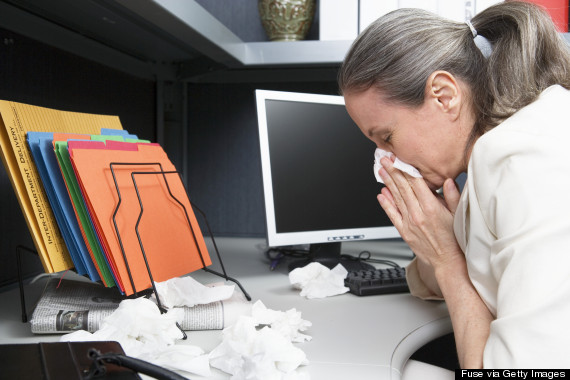
It goes without saying that it's hard to get work done when you can barely keep your eyes open. But it turns out that getting inadequate shut-eye can affect you at work beyond just making you feel sluggish.
Below, find seven ways sleep can affect you on the job -- and even your company's bottom line.
Getting too little (or too much!) sleep can mean more sick days.
A recent study in the journal Sleep showed that sleeping fewer than five hours or more than 10 hours a night is associated with staying home sick for 4.6 to 8.9 more days than people who sleep between seven and eight hours a night. This link "remained even after health and other key factors assumed to affect the association between sleep and sickness absence had been accounted for," study researcher Tea Lallukka, Ph.D., previously told HuffPost.
Sleep deprivation is hurting your employer -- and the economy.
In fact, sleep deprivation could be costing $63 billion to the U.S. economy each year due to lost productivity, according to a Harvard study reported by Health.com. People who experience some kind of insomnia -- whether it be waking up in the middle of the night, or having trouble falling asleep -- cost employers about 7.8 work days' worth of productivity a year.
Getting enough sleep keeps you thinking creatively.
Sleep is associated with innovation, and being deprived of it is associated with impairment in the mental ability, HuffPost's Carolyn Gregoire previously reported.
A lack of sleep can make you less productive.
The more sleep-deprived you are, the slower you become at getting tasks done at work, according to a 2012 Journal of Vision study. Researchers from Brigham and Women's Hospital found that accuracy and speed at a visual search computer task decreased the longer study participants were awake, Reuters reported.
Yes, sleep might have an impact on your wages.
As The Wall Street Journal pointed out recently, research shows that for people who are already not getting enough sleep, one extra hour in average sleep over the long run is associated with a 16 percent increase in wages.
Sleep strengthens the sort of memory that can help you on the job.
In a 2011 study, Michigan State researchers showed that sleep seems to improve what is called "working memory capacity." This form of memory seems to be associated with problem-solving, vocabulary, decision-making and reading comprehension.
Getting enough Zzs could mean less risk for job burnout.
A 2012 study showed that getting fewer than six hours of sleep is a predictor of job burnout, as well as "difficulties detaching from thoughts of work during leisure time." The findings suggest that it may not be stress itself causing burnout, but the recovery from stress -- and that "interventions to enhance sleep and recovery in occupational settings could help prevent burnout," the researchers wrote in the study.
